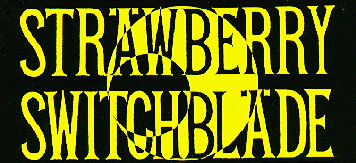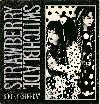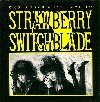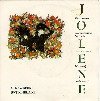 | |
Strawberry Switchblade never fitted in. They were faces of the year in 1985, before disappearing into
the obscurity they had emerged from; a peculiar punctuation to a peculiar decade of New Pop,
There was a lot of talk about New Pop in the '80s. Eventually it came to mean the type of sanitised
chart fodder as churned out by the likes of Duran Duran, Spandau Ballet, Culture Club, Nik Kershaw or
Howard Jones, whereas it ought to have meant the likes of Vic Godard and the Subway Sect or Scars.
Paul Morley, who wrote about the New Pop in the NME in the early '80s put it perfectly in his book
'ASK'; "If life was less complicated and everything had gone according to plan, Subway Sect's
'Ambition' would now be regarded as one of rock music's greatest number ones, and groups influenced
by Subway Sect, like Fire Engines, would now be more successful than Duran Duran."
Strawberry Switchblade were classic New Pop; categorised by most alongside Howard Jones, but in
truth belonging to the Morley defined elite. Their roots display their right to belong, and their whole
story strengthens their hold.
Rose McDowell and Jill Bryson were classic Glasgow punks. In the true spirit of the times they created
a personal visual revolution with mixed up style that was completely Pop. Attendants to the punk rock
explosion that electrified Glasgow in the late '70s, they were a part of the bohemian art scene who
adored the New York Dolls and who followed local peculiarities Nu-Sonics from pillar to post in their
brief and blinding 'career'.
As the Nu-Sonics dissolved, so the Sound Of Young Scotland began to develop across a range of
individuals and groups, showing what was possible in the post-punk fall out of the New Wave. Art
student David McClymont picked up a plectrum and joined ascendant Nu-Sonics metamorphosis
Orange Juice on stage in the dingy but brilliantly off the wall Vic Bar at the Glasgow School Of Art in
1979, and performed on a double bill that also show-cased Edinburgh's TV Art (later to become Josef
K). Elsewhere the important noises of Scottish youth were also blossoming, in Edinburgh's intense,
fractious and funky Fire Engines and their upstart reflections Scars.
Ludicrously glamorous and with a sharp attack in their guitar driven noise, Scars were probably the
most ill-treated and misrepresented of all the nascent talent to appear in the end of the decade
confusion, even more so than Orange Juice would eventually prove to be. But their sole FAST single,
the murderous sounding 'Adult(ery)' / 'Horrorshow ' stands still as testament to the potential for
frustrated genius to make classic Pop.
Meanwhile, the fledgling darlings of New Pop, Orange Juice, had recorded a live version of 'Felicity' as
a flexi-disc and intended to release it with a fanzine in true punk-rock style. The fanzine was to be
named after a James Kirk song, and was to be called 'Strawberry Switchblade'. The fanzine never
materialised, however, and the flexi eventually appeared as an addition to the debut Postcard single
'Falling and Laughing'. The name, however, was another matter.
Appropriated in true Pop Art tradition, Strawberry Switchblade became Rose and Jill's moniker in their
own chase towards Pop stardom.
The debut Strawberry Switchblade single was, and is a classic of pastoral pop. 'Trees and Flowers' - a
song perversely about the fears of the open air (it was about Jill's agrophobia) - mixed acoustic
instrumentation with Rose and Jill's great and individual vocals.
What was so great about Strawberry Switchblade was the imperfection. It was in their look (they called
themselves the 'scabby witches from Glasgow'), and it was in their sound. At a first, cursory listen their
harmonising vocals sound squeaky clean, crisp, like a million other girl groups. What set them apart
was the harsh edge that barely disguised accents brought.
'Trees and Flowers' had terrific pedigree; produced by David Balfe and Bill Drummond , it featured,
among others, a pre-stardom Roddy Frame, plus Mark Bedford and 'Woody' from by then stadium stars
Madness. On Balfe and Drummond's own brilliantly titled '92 Happy Customers' label, it was a perfect
showcase from which to build for the future.
'Trees and Flowers' and the minimalist 'Go Away' on the flip was a great foundation to build obsession
on. When it came out in 1982, Scott and I were just turning 16, and had a glorious summer of cycling
behind us. As we moved through winter into '83 with Jon, Gav, Vic et al, the obsession grew, and
inevitably alcoholic afternoons would end either to the strains of 'Trees and Flowers' or the taped Peel
session.
That John Peel session had four songs, and included a version of 'Trees and Flowers'. There were also
versions of 'Secrets', 'Little River' and (a truncated) '10 James Orr Street' ; songs which would later all
appear on the debut LP. It was a great collection of songs, and there are wonderful memories of lying
out late at night in the woods up near the castle with those songs playing softly on a beat-up mono tape
player. The sound was perfect; pure 'Just Like Gold' Aztec Camera, stripped and bare, open eyed and
excited. It was a brilliant summer to be sixteen.
We found out more about them too that summer through the Juniper Beri Beri fanzine that Jill herself
had a sleight of hand in, along with Stephen and Aggi of the Pastels. Juniper Beri Beri was a major
inspiration - the first fanzine i'd ever seen, it opened my ears to new sounds, a whole new underground
- and by the end of that year I'd written my own first attempt. Called 'Been Teen' after a Dolly Mixture
song, it chronicled among other things the new influences on my life of bicycles and pop such as the
Marine Girls, April Showers, Orange Juice and of course Strawberry Switchblade themselves.
The year that followed was a quiet one for Strawberry Switchblade, and we longed for more than just
the few treasures that we had uncovered. New hopefulls appeared, notably in the guise of the fledgling
Sunset Gun, but after the glossed over single version of 'Be Thankful' failed to live up the expectations
set by the sketchy, brittle demo, our thoughts once more returned to the promises of Strawberry
Switchblade. That promise was eventually delivered on in the guise of the single that gave them their
proverbial five minutes of fame
'Since Yesterday' was a slice of Pop confection custom baked for the most demanding of bitter-sweet
teeth. Everything was in its place; it soared and swooned in just the right amounts, and fittingly it made
Strawberry Switchblade stars in the public domain. It catapulted them from sharing photocopied pages
with the Pastels and the Membranes to sharing the glossy colour pages of Smash Hits with Duran
Duran and Boy George, and it sat them in peculiar juxtaposition with Mike Reid on Saturday morning
TV.
But 'Since Yesterday' didn't happen overnight either. It came out in October of 1984, a day starred in
my diary - a day when afternoon lectures at the Art School were ignored in favour of the record store
and several hours shooting pool in a grimy Glasgow basement bar. Somehow it fitted the moment.
Don't ask me how.
'Since Yesterday' came initially with a great fold out poster of Rose and Jill bathed in red light which
seemed to create a heart shaped halo around their somnambulist faces. Ribbons cascaded from their
hair and we spent many evenings drunk beneath their presence.
It made for a fabulous party record - everybody loved it (as they also loved April Showers' 'Abandon
Ship' - the perfect soul brethren sound of Glasgow's New Pop revolutionaries), and the fledgling
Strawberry Switchblade fanclub of Troon began to grow. Okay, so it numbered about ten by the time
the New Year parties ground to a begrudging halt with broken leather ties and not-so anonymous
greetings cards and drunken vows of alcoholic induced infatuations, but within a month it seemed you
couldn't move for polka-dots and ribbons; everyone claiming them for their own.
Not that we were sore about it. Strawberry Switchblade went way beyond snobbish elitism, and when
'Since Yesterday' finally hit the charts in the January lull, we were the ones cheering loudest. Some of
us even went out and bought it again, and sod the marketing ploy of issuing a cash-in picture disc.
To those who knew nothing of the vagaries of Pop history, 'Since Yesterday' probably made sense only
as a great example of disposable Pop. Which was fine, of course. But flipped over, the record betrayed
their roots, with the haunting, pared down 'By the Sea' and their fine take on the Velvet Underground's
'Sunday Morning'. Glimpses of the bigger picture, a heartening signal; and somehow you could never
picture Nik Kershaw covering 'All Tomorrows Parties'...
That Strawberry Switchblade were New Pop according to Paul Morley's definition was now clear to a
few, but for most, who inevitably couldn't have cared less, they belonged to the post New-Romantic
fancy, and this image was cemented by the fact that Rose and Jill undertook a tour as support act to the
then huge Howard Jones. An ironic situation, perhaps, but one devised to give them maximum
exposure. They seemed to be received well at their shows, and it was at this point that the promotional
flexi-disc for their LP surfaced. With Janice Long raving about their individuality betwen snatches of
the songs, this made for a strange artefact which has probably been mainly consigned to jumble sales
alongside copies of 'New Song' as a generation of Howard Jones fans grew up to buying Phil Collins
cds.
Despite what seemed like almost blanket coverage in the teen-mags, however, Strawberry Switchblade
failed to score another chart hit. The follow up single 'Let Her Go' never quite hit the same marks, but
still deserved better than the reception of idifference it seemed to meet with. A little too one-paced to
be a treasurable Pop Moment, it lacked the subtleties or suppleness of 'Since Yesterday' and left little to
the imagination. Still, it towered head and shoulders above most of the trounced up pap like Go-West,
5 Star or Animotion that it had to compete against.
The real treasures on the 'Let Her Go' record lurked on the flip side. As with most of their songs, it
seems the best recordings came when they were performed as pared down recordings. Avoiding
expensive recording techniques, they shone fiercest in session or near demo situations, and 'Beautiful
End' and 'Michael Who Walks By Night' show this perfectly. Recorded for the Janice Long show on
Radio One, they gave a hint at the spacious, pastoral side of Strawberry Switchblade that most teen
punters barely knew (or cared) existed. But neither this nor the kitsch release of a strawberry shaped
picture disc could convince the kids to push it into the charts.
The debut eponymous Lp appeared quickly in the wake of 'Let Her Go' and fared only marginally better
- denting the upper reaches of the chart before promptly dissappearing from view.
It was a flawed record, sure, but that was only part of the deal. Techno-trickery robbed several of the
older, familiar songs of their poise, and it took months before I could listen to the versions of 'Go Away'
or 'Little River' without wincing. Playing it again it still sounds a bit prone to '80s overdose of tinny tap
techno noises, but the perfect moments still way overshadow the dissappointments.
Basically, there are two sorts of songs; the burbling POP! hits (or misses) and the misty, moody ones.
The fast ones hurtle along breathlessly, whilst the slow ones conjure up a kind of gothic Jane Austin; all
lace blowing in your tearful eyes sort of scene. Which actually sounds belittling, and in fact '10 James
Orr Street' and 'Being Cold' are beautiful balladeering mementoes you ought to treasure forever.
A third single was released in late summer '85, and was as vital as any for a number of reasons, not least
because the lead track, the gorgeous and lush 'Who Knows What Love Is?' is one of their finest
moments. The other two tracks were equally good. 'Poor Hearts' is upbeat, another slice of great Pop.
It is the sound of late night Struthers playground, sitting atop a climbing frame, lost, lonely and
confused with thoughts of a blood splattered bedroom, pink flags and destructive relationships.
Strawberry Switchblade were a great teenage pop group.
The other track on the single was the Kitchensynchmixup of 'Let Her Go'; a brutal re-mix from the
hands of Balfe, Drummond and Youth (then of Brilliant), who were already making moves towards
their later emergence as Dance Terrorrists of the highest order.
At this time too their image began to alter. Gone were the muti-layered cascades of ribbons and
polka-dots, replaced by a move towards simple black leather and PVC - like Venus In Furs adapted for
the Smash Hits generation. The video carried this idea through to perfection, being almost a parody of
crossed genres, mixing Rose decked out in black leather, chained within a cage, with Jill in soft focus
white lace; the romantic idyll. For a while they had the video on the video jukebox in Troon's dubious,
solitary disco, and we would spend evenings annoying all and sundry by playing it over and over. Once
again however all this failed to convince the record buying public that Strawberry Switchblade should
ever be remembered as anything more then one-hit wonders.
1985 had started with such hope for Strawberry Switchblade, but ended in such despair; a fact which
my own life mirrored with agonizing accuracy. New affairs had developed under the light of their Pop
brilliance, and had just as swiftly turned sour. The pained fumblings of disasterous teenage love and
lust came crushingly to light that year, leaving scars that can still itch with discomfort today, nearly a
decade later. What began as frivolous fun to the strains of 'Since Yesterday' ended with dark, drunk
depressions listening to 'Psychocandy'; fittingly groups from opposite ends of the same spectrum first
glimpsed in the pages of Juniper Beri Beri.
A final single slipped out prior to Christmas '85 to end Strawberry Switchblade's year on a suitably
strange note. A cover version of the country and western favourite 'Jolene', this saw Strawberry
Switchblade give their final and most bizarre TV performance. Appearing on the lunchtime 'Pebble
Mill At One' show, Rose and Jill created a most peculiar and gratifyingly punk-rock image.
Shoehorned into short PVC dresses, they wore a minimum of make-up and finally looked like the
scabby witches they always insisted they were. Flailing their arms in that idiosyncratic windmill
fashion, they displayed un-shaven armpits and clear ripples of flab. It was so un-glamorous, so utterly
vicious and uplifting. It seemed like a last great Fuck You to the industry, and I for one was crying with
delight.
Despite that though, 'Jolene' was the one Strawberry Switchblade record that I never did buy. More into
the June Brides, Jasmine Minks, Hurrah! or The Loft to pay much attention, I left it to be picked up at a
later date. That later date never did arrive though, and to this day I regret that gap in my collection.
Record fairs, junk shops and jumble sales' record racks have all been scoured, but so far in vain.
Perhaps one day...
When 1985 blinked into 1986, Strawberry Switchblade were all but forgotten. Dropped by Warners'
subsidiary Korova, they slipped back into obscurity, with Rose flirting with various projects and Jill it
seemed almost dissappearing from the face of the planet.
By the time the second half of the decade lurched into action the notion of the New Pop too had become
all but forgotten. In the aftermath of Live Aid, Rock's Oldest Guard enjoyed a resurgence in popularity,
and in harmony with the culture of the times it was overblown conservative pomp that ruled the day.
No longer an arena for fancy and risk taking, the face of chart pop changed to grey, empty, gestural
rock histrionics. Phil Collins and Dire Straits were revered as teen idols, and even someone like the
Eurythmics, who had begun with New Pop hopes, became sanitised dull fodder for Ford Sierra drivers.
1986 was a dreadful time to be a teenager.
1986 was a brilliant time to be a teenager. The New Pop may have been stamped on by corporate Rock
hippies in suits, but the Underground was all the more vibrant as a result. Paul Morley's reference
points were to be seen in much of the insurgent independant scene, and the Creation label should have
become the perfect New Pop label.
Creation was flawed, but it was pure Pop obsession, and that was what counted. It's best acts and
records showed off the New Pop influences perfectly. The Jesus and Mary Chain would cover
'Ambition', whilst fellow noise terrorists Meat Whiplash took their name from a Fire Engines song and
would speak fervently about the importance of Godard and The Subway Sect. Best of all were the
Jasmine Minks and The Bodines, with their shades of 'Adventure' Television meets Devoto's Magazine.
That Strawberry Switchblade should find a welcome at the door of Creation was only to be expected.
They came from the same tradition, and shared a lot from the past. A lot of the Faces at Creation had
come from the same kinds of Glasgow punk and post-punk circles that Rose and Jill had come from,
and the associations seemed only natural. Jill had, after all, been closely involved in Juniper Beri Beri
with Stephen and Aggi Pastel, and McGee himself had been a sattelite member of the hazy Postcard
scene, observing and absorbing Horne's triumphs and mistakes.
Strawberry Switchblade never made a record for Creation, though there was a lot of talk and hopes.
Rose had demos of a number of songs that she had recorded under the moniker 'Sunflower' from 1985
(presumably late '85 when Strawberry Switchblade were all but finished), October '86 and March/April
of 1987, but of these only 'Beautiful End' appeared as a bona-fide release (as a Strawberry Switchblade
b-side). 'Crystal Days', from the 1987 session, cropped up as the b-side to a dodgy bootleged 12"
released in 1988 by a strange Switchblade fan, which Rose tried to get withdrawn by her lawyers. The
a-side of the single was a cover of Blue Oyster Cult's 'Don't Fear The Reaper', and adds little to the
story in terms of quality. Of the other Sunflower tracks, however, there was much to take heart from,
despite the fact that the lack of Jill's harmonies left a discernable gap. Best were the slower tracks like
'Tibet', 'Winds Of Heaven' or the moody 'Soldier', although songs like 'Sunboy' and the great 'So
Vicious' showed a true heart of Pop still beating strongly.
Strawberry Switchblade may not have released any further records, on Creation or otherwise, but they
did perform some memorable shows. The most notable was the first in Brighton, where rock'n'roll
excess was much in evidence, although the stories of Rose dancing naked in a cage in the club run by
Bobby Gillespie have not been confirmed. Not that the re-formed Strawberry Switchblade shows were
not suitably peculiar events. Using a backing band constructed of members of numerous Creation
groups, they were a weird amalgam of styles and statures. You could count members of the Weather
Prophets, Biff Bang Pow!, Primal Scream and Felt on stage at any one time, each adding some
definitive ingredient to proceedings. Best was Lawrence, who played entirely with his back to the
audience. Press hacks suggested this was becuse he was embarassed, but typically Lawrence answered
in dead pan that he was just trying to hear his monitor. There were plans for this 'Creation Supergroup'
to tour as Strawberry Switchblade that summer and autumn, but typically they remained as merely
fanciful ideas, as Creation began chasing grander schemes with new rock darlings House Of Love and
My Bloody Valentine.
So ended the hopes of a Strawberry Switchblade revival, and inevitably too the story of the eighties'
New Pop dream. That Creation should within five years see it's greatest successes come courtesy of the
type of Rock that Subway Sect or Fire Engines set out to destroy was as finally ironic as swallowing the
corporate dream, and the almost concurrent re-appearance of Postcard with a resurgent Vic Godard at
the forefront of their avant garde Popism. Perhaps if Godard can be rescued from the shadows then
there is yet hope for a Strawberry Switchblade reformation, to put out records that would again compete
as Pop masterpieces. Perhaps not...
In the end, though, what does all this lead to? After all the history and jigsaw associations have fallen away what i'm left with are still just the memories; painful and exhilarating both. It's all that great Pop should ever expect to be really, and instead of the thoughts of polka-dots and ribbons, all that Strawberry Switchblade should ultimately be remembered for.
Alistair Fitchett, 1994. | |
 |  |
Edit this biography









